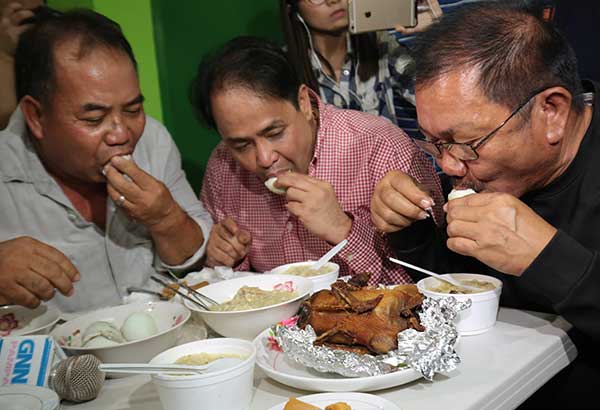2 poultry workers being monitored

YUMYUM: Agriculture Secretary Emmanuel Piñol (right) and Pampanga Vice Gov. Dennis Pineda eat balut and fried chicken yesterday in San Luis town, bird flu Ground Zero. STAR/Michael Varcas
MANILA, Philippines - Two poultry workers in Pampanga are being monitored for showing symptoms of avian flu, a health official said yesterday.
Department of Health (DOH) spokesman Eric Tayag said one of the workers had a cough while the other had fever – two of the symptoms of bird flu.
The two unnamed workers are among 20 interviewed by DOH disease experts sent to Pampanga to help the Department of Agriculture (DA) investigate the outbreak of the disease that has killed thousands of fowl at poultry farms since its outbreak in April.
“Influenza is characterized by fever, cough and sore throat so their symptoms are not complete. But because of the fact that they have symptoms, we can now call them ‘suspect cases.’ They have been isolated in a hospital so that they can be monitored closely,” Tayag said in a press conference.
The DOH, he said, expects the Research Institute for Tropical Medicine to release today the results of the laboratory tests on the swab and blood samples collected from the workers.
He added the workers’ household members were also interviewed but health personnel see no need to put them in isolation, citing the “great difficulty” of an infected fowl transmiting the disease to humans or an infected human to another.
Despite this, Tayag urged the public not to panic, saying the DA is doing its best to prevent the infection from affecting other poultry farms.
“Right now, it’s an animal health problem because the bird flu virus infected animals – the chicken – and that is a cause for alarm. But in public health, not yet because first, we still have no (human) case and there is difficulty in transmission and only those in the farm can be infected. We who eat chicken can hardly get infected,” he said.
Tayag also stressed getting anti-human influenza shots cannot protect a person against animal virus. However, it could prevent virus mutation in case a human sick with influenza gets exposed to an animal infected with bird flu.
“This (mutation) is what we have been closely looking out for because it was the start of the pandemic influenza (in the past),” he maintained.
Health experts have assured the public the Philippines is prepared to deal with the problem even if humans get infected by the outbreak in Pampanga.
He added the country started preparing in 1997 when the first bird flu case was reported in Hong Kong. An Inter-Agency Committee on Zoonosis composed primarily of experts from the DOH and the DA handled the preparations.
Moreover, government hospitals are equipped with “personal protective equipment” for health personnel handling such cases. Health workers have also been trained in dealing with infectious diseases.
Tayag said that since the pandemic H1N1 in 2009, the DOH has been stocking up on Oseltamivir (Tamiflu), an antiviral medication that blocks the action of influenza viruses in the body.
Currently, the agency has over 800,000 tablets in its stocks and 8,000 of them have been sent to Pampanga.
“What we did and learn from SARS (Severe Acute Respiratory Syndrome) pandemic, MERS-Cov (Middle East Respiratory Syndrome-Corona Virus) and Ebola, we can use in bird flu. So I can say we have been preparing for this,” he added.
Not taking chances, the Bureau of Quarantine is closely monitoring at the Ninoy Aquino International Airport (NAIA) terminals all poultry cargoes from Manila bound for other provinces.
Philippine Airlines (PAL) and Cebu Pacific (CEB) said they are allowed to transport poultry products from the Visayas and Mindanao to Luzon.
Criminal liability
In San Fernando, Pampanga, Bureau of Animal Industry (BAI) officer-in-charge Enrico Ganzon said they are looking into possible criminal and administrative liability of poultry owners and veterinarians who failed to immediately report avian flu cases back in April in San Luis town now under quarantine.
“It is possible the veterinarians were pressured by poultry owners not to report the case for fear of losses,” he said after meeting with poultry raisers affected by the ban on movement of chickens and eggs in “controlled areas” within seven kilometers from San Carlos.
All poultry within a one-kilometer radius of affected farms in San Carlos are now being culled and buried.
Ganzon could not immediately say what criminal and administrative charges could be filed against the veterinarians and poultry owners.
Earlier, Pampanga Gov. Lilia Pineda said a poultry raiser was found to have kept secret the death of thousands of chickens in his farm. The unnamed raiser claimed he did not suspect avian flu as the cause of the deaths.
Pineda said the poultry owner had admitted the mysterious deaths starting April and that the dead birds were burned and buried. He reported the case to San Luis Mayor Venancio Macapagal when more chickens turned up dead in his farm.
Pineda has also asked giant poultry companies such as San Miguel Corp. to help clear the province of infected fowl. “I’m calling on SMC, Bounty Fresh and other companies to help Pampanga get rid of bid flu threat,” she said in Filipino.
Meeting with poultry owners from towns within the seven-kilometer radius quarantine zone, Dr. Arlene Vytiaco, head of BAI’s animal disease and control division, said that after culling some 200,000 chickens, quarantine officers would disinfect six affected farms and a new set of fowl called “sentinel birds” would be brought in after 21 days.
If the sentinel birds don’t fall sick after 90 days, the quarantine restrictions would be lifted, she said. “Even cockfighting is not allowed until quarantine has been lifted,” she said as she appealed for understanding for the restrictions.
At Malacañang, presidential spokesman Ernesto Abella said the Armed Forces of the Philippines (AFP) might be tapped to help contain the disease, specifically in culling affected birds.
“Perhaps if needed the AFP can field more men to cull birds, this is after all no small calamity,” he said at the regular press briefing at Malacañang yesterday.
While the administration recognizes the plight of affected farmers and other stakeholders in the poultry industry, Abella stressed that public health and safety should be given priority.
He also said lack of manpower is hampering efforts to clear affected poultry farms.
“Despite their lack of personnel we urge DA and BAI to expedite their various clearing operations to minimize the losses and hasten the recovery of the poultry industry,” he said.
Agriculture Secretary Emmanuel Piñol earlier said his department, through the BAI, has formed a biosecurity team to conduct nationwide inspection of poultry farms.
“We will start as soon as possible. We will start with the farms surrounding San Luis,” he said.
The BAI is still waiting for the results of laboratory tests in Australia to determine whether the avian flu strain found in San Luis could affect humans. The results may be out within two weeks.
No imports please
As fears emerge over possible supply shortage in chicken and even pork due to the bird flu outbreak, the local industry is cautioning the government against resorting to importation.
The Samahang Industriya ng Agrikultura (Sinag) said the DA should not consider importation just to allay the fears of the consuming public that there might be shortage, especially as the Christmas season nears.
“Let us not look at imports. We don’t want to think that this issue is being widely discussed just to serve some interest. We have enough, why do we need to import?” Sinag chairman Rosendo So told The STAR.
“Plus some of the major sources of our chicken imports also have avian influenza, with even worse strains. While this is the first time that we are experiencing this, other countries have this already,” he added.
The Philippines is sourcing some of its poultry and poultry products from several countries including the US, Taiwan, Germany and other European countries.
“The DA opened the importation of seven million kilograms of pork since May and yet no volume has arrived. Why? Because prices have been high in the world market also,” So said.
Prices of chicken meat in markets have dropped due to fear of possible transfer of the virus to humans.
Sinag said this has severely affected the livelihood of poultry raisers even those outside the affected area in Pampanga.
“Farm gate prices have been much lower by P20 per kilogram just five days since the outbreak. Farm gate price is now almost equal to the cost of production. They have been selling lower volume and still at a much lower price,” So said.
Market monitoring in major wet markets in Metro Manila showed that retail prices of chicken went down to P135 per kilogram from the average P160 per kg.
Wholesale prices also decreased to P110 per kg from the P125 per kg before the announcement of the bird flu outbreak last Friday.
In terms of pork meat, prices remain stable, ranging from P200 to P220 per kg and have not moved since Friday.
“We are encouraging members of the industry to not increase their retail prices because it will be the consumers that will suffer,” he added.
The Quezon City government also said it has intensified its inspection of chickens sold at public markets.
“This is proactive measure to prevent the entry of contaminated chickens in our markets,” Ana Marie Cabel, city government veterinarian, said in a phone interview.
Overreacting
Sinag’s So also said the government “overreacted” in dealing with the avian flu outbreak.
“If you go to Taiwan, they would not tell you that we have avian flu here and you should not eat chicken because they isolate the (affected) place,” he said.
He added the problem’s impact on sales is aggravated by the lean months.
“Everybody panicked. The announcement was wrong,” he said.
So recalled that a piggery farm was also hit by Ebola virus years ago “but there was no overreacting” even after the farm was placed under quarantine.
The Sinag chair said the poultry industry would overcome the problem, but how soon, “it depends on the handling of government.” He said authorities should have just isolated the affected town.
He revealed Batangas was very much affected as it is shipping poultry products to the south and it produces half of Luzon’s egg requirements.
In the Philippines, So said chicken production a year is at 1,674, 505 metric tons, the bulk of which come from Central Luzon at 590, 993 MT.
Sinag also urged the DA to lift the temporary ban on the movement of live domestic and wild birds and their byproducts from Luzon to the Visayas and Mindanao.
“We are hoping that they will reconsider to lift the ban on shipments. They just have to impose stringent measures in the province,” So said.
“They should reconsider the scope and the curtailment of movement. It is not necessary at this time. It is just limited to two towns, not the whole Philippines,” he added.
Piñol, meanwhile, assured the consuming public that it is safe to eat chicken meat despite the outbreak.
“Our fear that chickens come from the contained area in Pampanga is not true. In fact, now is the best time to buy chicken as it is very cheap,” Piñol said.
“Let us not believe those saying that it is not safe to eat chicken. Let us leave this problem to the experts. It has been confirmed by four laboratory tests that the virus is negative for H5N1 or the type that can cross over to humans,” he added. – With Eva Visperas, Emmanuel Tupas, Christina Mendez, Ric Sapnu, Ding Cervantes, Rudy Santos
- Latest
- Trending



























